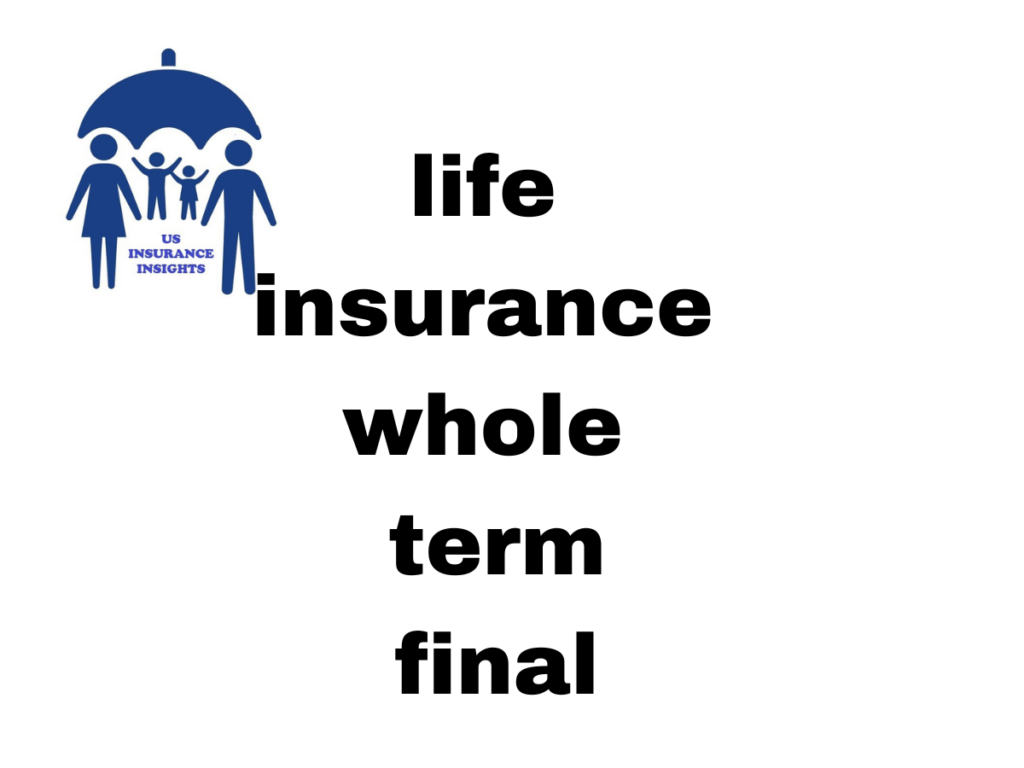Life is unpredictable, but life insurance whole term final ensures that your loved ones remain financially secure no matter what happens. Whether you’re planning for retirement, securing your family’s future, or simply looking for peace of mind, understanding this insurance type is essential.
What is Life Insurance Whole Term Final?
Life insurance whole term final is a type of permanent life insurance that provides coverage for your entire life as long as you pay the premiums. Unlike term life insurance, which covers you for a set number of years, whole life insurance ensures your beneficiaries receive a guaranteed death benefit regardless of when you pass away.
Why Choose Whole Term Final Life Insurance?
Many people opt for whole term final life insurance because it provides a combination of lifelong protection and a cash value component that grows over time. Here are some key reasons why this insurance is a smart investment:
- Lifetime Coverage: Your policy remains active throughout your life.
- Guaranteed Death Benefit: Your beneficiaries will receive a tax-free payout.
- Builds Cash Value: The policy accumulates savings over time.
- Fixed Premiums: Your monthly payments stay the same for life.
- Financial Security: Helps cover final expenses, debts, and even inheritance planning.
How Does Life Insurance Whole Term Final Work?
When you purchase a life insurance whole term final policy, you agree to pay a fixed premium either monthly or annually. A portion of this payment goes toward the death benefit, while another portion contributes to the cash value account, which grows tax-deferred over time.
If you ever need to borrow against your policy or surrender it for cash, you have the flexibility to do so. However, borrowing against your policy will reduce the death benefit if the loan isn’t repaid.
Step-by-Step Guide to Choosing the Right Policy
Step 1: Assess Your Financial Needs
Ask yourself:
- How much coverage does my family need?
- Do I want to leave an inheritance?
- How much can I afford in premiums?
Step 2: Compare Insurance Providers
Look for companies with strong financial ratings and positive customer reviews. Some well-known providers include:
Step 3: Understand Policy Terms and Riders
Many policies offer riders that enhance your coverage, such as:
- Accelerated Death Benefit Rider – Allows access to funds if diagnosed with a terminal illness.
- Waiver of Premium Rider – Waives premiums if you become disabled.
Step 4: Get a Quote and Apply
Most insurance providers offer free online quotes. Once you choose a policy, you’ll go through a medical exam (in most cases) and underwriting before final approval.
Common Myths About Life Insurance Whole Term Final
Myth 1: It’s Too Expensive
While whole life insurance is costlier than term life, it provides lifelong coverage and cash value benefits, making it a smart long-term investment.
Myth 2: I Don’t Need It If I’m Young
Buying a policy early locks in lower premiums, ensuring lifelong coverage at an affordable rate.
Myth 3: Only Breadwinners Need It
Stay-at-home parents and retirees also benefit, as policies help cover final expenses, debts, and even legacy planning.
The Best Time to Buy Whole Life Insurance
The earlier, the better! Insurance premiums are based on age and health. Buying a policy in your 20s or 30s means significantly lower premiums compared to purchasing it in your 50s or 60s.
Final Thoughts: Is Life Insurance Whole Term Final Right for You?
If you’re looking for lifetime protection, cash value growth, and a financial safety net for your family, then life insurance whole term final is a fantastic choice. By planning ahead, you’re securing peace of mind and ensuring your loved ones are well taken care of.
FAQs About Life Insurance Whole Term Final
1. Can I borrow from my whole life insurance policy?
Yes! The cash value portion of your policy allows you to borrow money if needed.
2. What happens if I stop paying my premiums?
If your policy has accumulated enough cash value, it may cover the premium payments. Otherwise, the policy could lapse.
3. Is the death benefit taxable?
No, the death benefit is usually tax-free for beneficiaries.
4. Can I convert term life insurance to whole life?
Some insurers offer conversion options, allowing you to switch from term to whole life without a medical exam.

